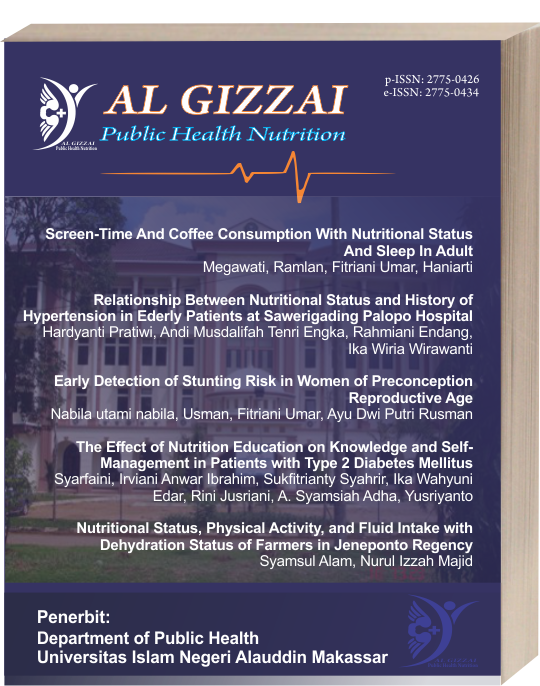Nutritional Status, Physical Activity, and Fluid Intake with Dehydration Status of Farmers in Jeneponto Regency
Abstract
Dehydration that occurs in adults is influenced by various factors including age, gender, fluid intake, physical activity, nutritional status, body temperature and environmental temperature. This study aims to determine the relationship between nutritional status, fluid intake and physical activity with the incidence of dehydration in corn farmers in Jeneponto Regency. This research is a quantitative study using an analytic observational approach with a Cross Sectional Study design. The sample in the study was 99 respondents obtained by using the slovin formula with the Proportional Random Sampling technique based on the residence in the respondent's hamlet area. Data were analyzed using the chi-square test. To determine the risk (Odds ratio) of exposure to cases, a confidence interval (CI) value of 95% (α 0.05) was used. The results of the study showed that there was a relationship between nutritional status (p=0.000, OR=0.659), physical activity (p=0.000, OR=3.430) and fluid intake (p=0.003, OR=0.225) with dehydration status in farmers in Jeneponto District. Nutritional status, physical activity and fluid intake are risk factors associated with dehydration in corn farmers in Jeneponto Regency. Corn farmers are expected to pay more attention to daily fluid intake, by bringing drinking water facilities to the workplace and consuming drinking water at least 2 liters/day.
References
Amaliya, R. M. (2018). Gambaran Status Hidrasi dan Hubungannya dengan Jenis Kelamin, Indeks Massa Tubuh, Aktivitas Fisik, dan Jumlah Air yang Dikonsumsi pada Mahasiswa Preklinik Fakultas Kedokteran Universitas Negeri Syarif Hidayatullah Jakarta Tahun 2018. https://repository.uinjkt.ac.id/dspace/handle/123456789/53528
Angesti. (2013). Hubungan status gizi dan faktor lainnya dengan status hidrasi pada remaja di 3 SMA Kota Bekasi. [Skripsi]. Universitas Indonesia, 2013.
Briawan, D., Sedayu, T. R., & Ekayanti, I. (2011). Kebiasaan minum dan asupan cairan remaja di perkotaan. Jurnal Gizi Klinik Indonesia, 8(1), 36. https://doi.org/10.22146/ijcn.17729
Buanasita A, Andriyanto, Sulistyowati I. Perbedaan Tingkat Konsumsi Energi, Lemak, Cairan, dan Status Hidrasi Mahasiswa Obesitas dan Non Obesitas. Indonesian Journal of Human Nutrition, 2015; 2(1) : 11 –22. https://doi.org/10.21776/ub.ijhn.2015.002.01.2
Chang, T., Ravi, N., Plegue, M. A., Sonneville, K. R., & Davis, M. M. (2012). Inadequate hydration, BMI, and obesity among US adults: NHANES 2009-2012. Annals of Family Medicine, 14(4), 320–324. https://doi.org/10.1370/afm.1951
Fang, Z., & Cao, C. (2014). Estimation of forest canopy height over mountainous areas using satellite lidar. In IEEE Journal of Selected Topics in Applied Earth Observations and Remote Sensing (Vol. 7, Issue 7). https://doi.org/10.1109/JSTARS.2014.2300145
Fitriah, N., Setyawan S, H., Adi, M. S., & Udiyono, A. (2019). Faktor Risiko Kejadian Dehidrasi pada Petani Garam di Kecamatan Kaliori, Kabupaten Rembang. Jurnal Epidemiologi Kesehatan Indonesia, 2(2), 49–54. https://doi.org/10.7454/epidkes.v2i2.1843
Gaol, M. J. L., Camelia, A., & Rahmiwati, A. (2018). ANALISIS FAKTOR RISIKO KELELAHAN KERJA PADA KARYAWAN BAGIAN PRODUKSI PT. ARWANA ANUGRAH KERAMIK, Tbk. Jurnal Ilmu Kesehatan Masyarakat, 9(1), 53–63. https://doi.org/10.26553/jikm.2018.9.1.53-63
Kavouras, S. A. (2019). Hydration, dehydration, underhydration, optimal hydration: are we barking up the wrong tree? European Journal of Nutrition, 58(2), 471–473. https://doi.org/10.1007/s00394-018-01889-z
Maffeis, C., Tommasi, M., Tomasselli, F., Spinelli, J., Fornari, E., Scattolo, N., ... & Morandi, A. (2016). Fluid intake and hydration status in obese vs normal weight children. European journal of clinical nutrition, 70(5), 560-565. https://doi.org/10.1038/ejcn.2015.170
Miller, H. J. (2015). Dehydration in the Older Adult. Journal of Gerontological Nursing, 41(9), 8–13. https://doi.org/10.3928/00989134-20150814-02
Merita, M., Aisah, A., & Aulia, S. (2018). Status Gizi Dan Aktivitas Fisik Dengan Status Hidrasi Pada Remaja Di Sma Negeri 5 Kota Jambi. Jurnal Ilmu Kesehatan Masyarakat, 9(3), 207-215.
Murray, B. (2007). Hydration and physical performance. Journal of the American College of Nutrition, 26(sup5), 542S-548S. https://doi.org/10.1080/07315724.2007.10719655
Nilamsari, N., Damayanti, R., & Nawawinetu, E. D. (2018). Hubungan Masa Kerja Dan Usia Dengan Tingkat Hidrasi Pekerja Perajin Manik-Manik Di Kabupaten Jombang. Jurnal Kesehatan Terpadu (Integrated Health Journal), 9(2), 1–9. https://doi.org/10.32695/jkt.v2i9.14
Sari, N. A., & TS, N. (2018). Hubungan asupan cairan, status gizi dengan status hidrasi pada pekerja di Bengkel Divisi General Engineering PT PAL Indonesia. Media Gizi Indones, 12(1), 47-53.
Perales-Garcia, A., Ortega, R. M., Urrialde, R., & Lopez-Sobaler, A. M. (2018). Physical activity and sedentary behavior impacts on dietary water intake and hydration status in Spanish schoolchildren: A cross-sectional study. PLoS One, 13(12), e0208748. https://doi.org/10.1371/journal.pone.0208748
Pustisari, F., Sitoayu, L., Nuzrina, R., Angkasa, D., & Gifari, N. (2020). Hubungan Aktivitas Fisik, Konsumsi Cairan, Status Gizi Dan Status Hidrasi Pada Pekerja Proyek. Jurnal Gizi, 9(2), 215-223. https://doi.org/10.26714/jg.9.2.2020.215-223
Putri, N. P., & Z, A. F. (2020). Manfaat Air Minum bagi Kesehatan Peserta Didik pada Tingkat MI/SD. Al-Adzka: Jurnal Ilmiah Pendidikan Guru Madrasah Ibtidaiyah, 10(1), 33. https://doi.org/10.18592/aladzkapgmi.v10i1.3622
Tyrwhitt-Drake, R., Ferragud, M. A., & De Andrés, R. U. (2014). Knowledge and perceptions of hydration: A survey among adults in the United Kingdom, France and Spain. Revista Espanola de Nutricion Comunitaria, 20(4), 128–136. https://doi.org/10.14642/RENC.2014.20.4.5026
Widyaningrum, C. C., Budiono, & Athiyyah, A. F. (2012). Hubungan Status Gizi Dengan Derajat Dehidrasi Pada Pasien Diare Balita di RSUD dr. Soetomo. Jurnal Unair, 59–63.
Yang, X., Wu, H., & Li, H. (2020). Dehydration-associated chronic kidney disease: A novel case of kidney failure in China. BMC Nephrology, 21(1), 1–5. https://doi.org/10.1186/s12882-020-01804-x
Zhang, J., Zhang, N., Liu, S., Du, S., He, H., & Ma, G. (2021). The comparison of water intake patterns and hydration biomarkers among young adults with different hydration statuses in Hebei, China. Nutrition & Metabolism, 18, 1-14. https://link.springer.com/article/10.1186/s12986-020-00531-2
Copyright (c) 2023 Syamsul Alam, Nurul Izzah Majid

This work is licensed under a Creative Commons Attribution-NonCommercial-ShareAlike 4.0 International License.
Authors retain copyright and grant the journal right of first publication with the work simultaneously licensed under a Creative Commons Attribution-NonCommercial-ShareAlike 4.0 International License that allows others to share the work with an acknowledgment of the work's authorship and initial publication in this journal.
Authors are able to enter into separate, additional contractual arrangements for the non-exclusive distribution of the journal's published version of the work (e.g., post it to an institutional repository or publish it in a book), with an acknowledgement of its initial publication in this journal.
Authors are permitted to publish their work online in third parties as it can lead to wider dissemination of the work.










